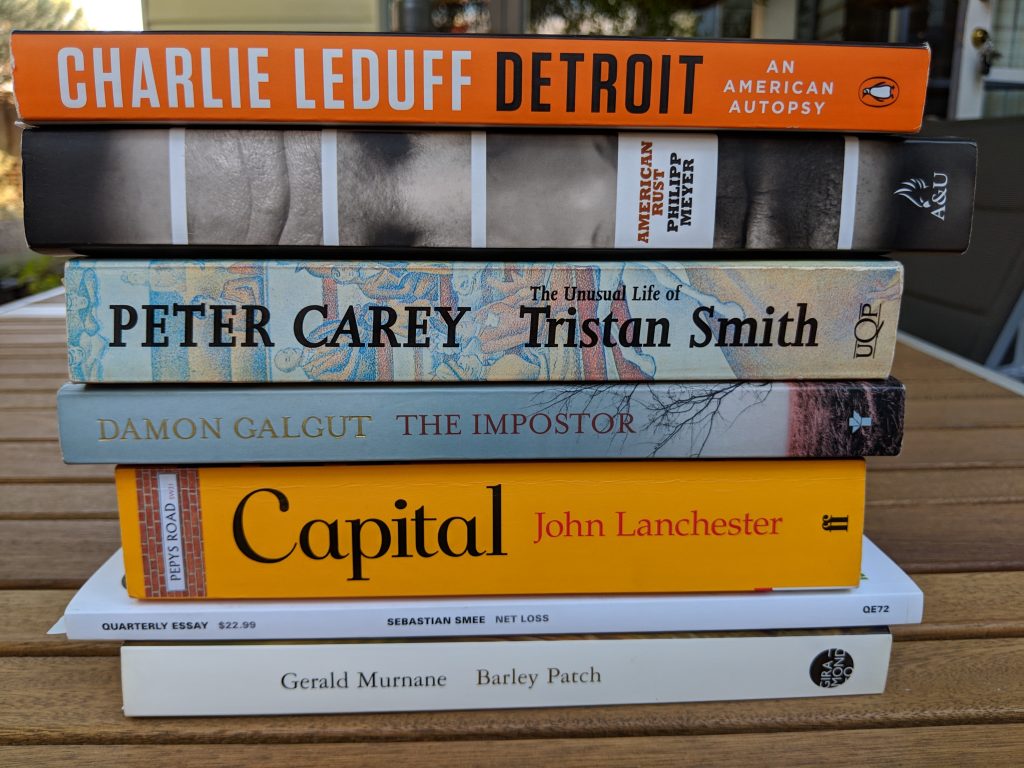
I’ve had a great start to the year with my reading, and nearly all of the books have been wonderful. Inspired by a new podcast called BackListed, I plan to venture off my safe path of Murnane, Galgut and Carey one day, but not just yet. I managed to get through about 3 and a half books in two weeks on our New Zealand cruise, and it was all very effortless.
Murnane’s Barley Patch had been sitting around in my piano / computer room for 10 years and I don’t know why. I have a feeling I bought it after listening to him be interviewed at the Melbourne Book Festival back then, but I’m confused by the Readings sticker, since I think the event was at the MaltHouse Theatre. Regardless, I’m going to be vague here and say that once again, his mesmerising and voyeuristic prose will always captivate me, even if I’m occasionally irritated by his wilful and pedantic use of “boy-man” and “image-object” and digressions about what defines fiction writing, however I’m still planning to go to the Goroke Bowling Club one day and shyly stalk my literary hero in his final days. 4 stars.
As someone who thought in 1994 (and still thinks) that the internet was the greatest thing in the world, I felt I needed to see what cultural richness I’d missed in my life, and Sebastian Smee’s Quarterly Essay Net Loss tried pretty hard to describe it to me. It’s true that with phones around, “it gets hard to pick up a book, harder to stay with it”, but I felt that way playing World of Warcraft too. I was more convinced watching a YouTube video of Roald Dahl writing in his shack than I was after 56 pages of Net Loss. 3 stars.
I’m pretty sure that this is my second John Lanchester book, and both have been straightforward, but intriguing stories. This one, Capital, reads like a BBC drama series (and apparently became one), and beguiles with the premise of a nasty campaign against the (mostly) wealthy home owners of Pepys Road, London by an unknown have not, who leaves “We want what you have” messages everywhere, and which escalates. A little cliche prone at times, but it was fresh and humane and a joy to read. It had me waiting nearly the full 575 pages before spilling the beans. 4 stars.
The Imposter, by Damon Galgut is about an early 40’s man, having lost his 20 year corporate job who finds himself being dared to write the poetry he always dreamed of doing in a rundown rural shack owned by his brother, many hours drive from Johannesburg. Aimless months go by with little progress and the man, finding himself progressively becoming unhinged is grateful when an old now-wealthy school friend takes him on board and offers him weekends away with his wife whilst they transform and old game park into a golf course with plenty of graft and money involving local officials.
This is yet another wonderful book by Galgut whose sense of the racial and wealth divide in South Africa is always concisely detailed and who manages a broody unpredictable storyline in all his novels. 4.5 stars.
I’ve finally spat the dummy with an early Peter Carey book, managing 96 pages of The Unusual Life of Tristan Smith before giving up in disinterest. The forced quirkiness and richness of unlikeable characters felt implausible and inconsistent to me; the construct of the lands of Voorstand and Efica (seemingly a simple name replacement for Australia and New Zealand) added just for novelty. I’m a little afraid to go back and read Illywhacker again in case I feel the same way – I think my tastes have just moved on a bit. I wonder if Carey himself feels a little sheepish about this book in 2019? 2 stars.
American Rust by Philipp Meyer was a much more straightforward, but convincing affair set in a rural Pennsylvania steel town, probably one of thousands of novels published in the last few decades documenting missed opportunities and the jobless consequences for blue collar workers. I found it pretty dark (particularly the prison and the hitchhiking / homeless sections), but it rang true and was a compelling read, jumping between 4 or 5 viewpoints. A self-confident high school jock son finds himself involved in an accidental death of a vagrant and wrestles with his allegiances, whilst a world weary sheriff is forced to make a decision between his relationship with the boys mother or his job. Satisfying and convincing. 4 stars.
Detroit by Charlie LeDuff was not quite the anthology I expected, and in a good way. It’s a memoir of 5 parts ego, 2 parts good Samaritan and 4 parts tabloid gonzo journalist, chasing anything that would sell copies of the Detroit News. LeDuff is no doubt a no-bullshit, ballsy guy who rocked a lot of boats amongst those in power in Detroit by exposing corruption, lack of resourcing and the third world-ness of his hometown. There’s not a lot of hope or positivity in this book, but it’s a hell of an eye-opener and his writing is authentic and utterly frightening. 4 stars.